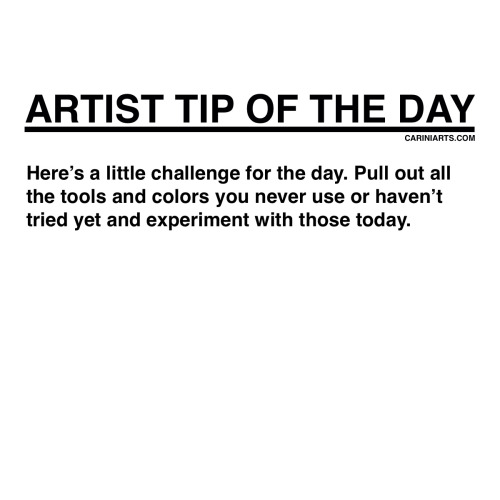Pink Robin Bird
Pink Robin Bird

The pink robin is a small passerine bird native to southeastern Australia.

Its natural habitats are cool temperate forests of far southeastern Australia.

Like many brightly coloured robins it is sexually dimorphic.

Measuring 5.3 in in length, the robin has a small, thin, black bill, and dark brown eyes and legs.

The male has a distinctive white forehead spot and pink breast, with grey-black upperparts, wings and tail. The belly is white.

Its range is the forests of southern Victoria and neighbouring parts of South Australia and New South Wales, and Tasmania.

Pink Robin Bird
More Posts from Donutdomain and Others
i learned about Tim Wong who successfully and singlehandedly repopulated the rare California Pipevine Swallowtail butterfly in San Francisco. In the past few years, he’s cultivated more than 200 pipevine plants (their only food source) and gives thousands of caterpillars to his local Botanical Garden (x)

How to learn drawing MH monsters
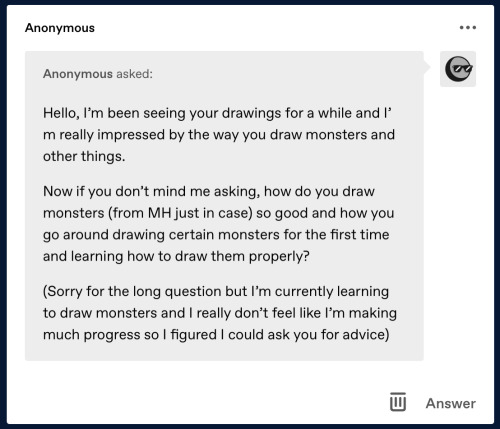
Hey Anon! First of all I’m very honored, thanks a lot!!
You’re asking a very interesting question in my opinion, so I hope you will find a long response interesting as well c:
When I want to learn how to draw a new Monster, I base myself on the Monster’s design (ofc) but also on general knowledge, especially anatomy. Anatomy is crucially important even when drawing creatures that do not exist, simply in order to make them believable!
So if you struggle to draw MH Monsters, that are famous for their ‘realism’ and believability, first ask yourself what level you have in basic anatomy: if you know how skeleton works, muscles work, transcribing it into proportions and joints, things like that.
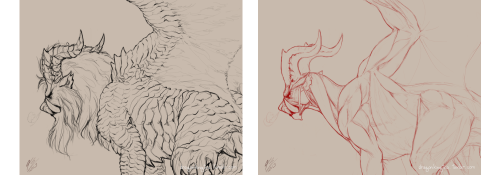
(Art I made for fun for my RP blog)
I sadly can’t offer you much advice on how to learn it, because anatomy is partly intuitive to me; and lots of my artistic anatomy studies were more centered around human anatomy (however, a lot of muscle groups are similar to animals, so even my knowledge of humans is useful when drawing monsters). I also have to mention I’m a vet student, and we had medical anatomy classes in the first year, which helped a lot as well; but I’m sure you can find online resources that will teach you the basics for art!
Keep reading
how to hit your guys with the crust rays
a friend of mine was having trouble with a character of hers, he was middle-aged but looked too young, so she came to me for help. i'm something of a middle-aged-man-fan so i whipped up this quick thing to help her out. it might be useful to somebody out there so i'll share it here too!

I'm currently working on an animatic, could you give me any advice?
1.

2.

3.

4.

5.

I still haven’t taken any animation or storyboarding classes, but these are general TECHNICAL tips I’ve learned online and through trying to fix my own boards. Definitely practice with things your passionate about/interested as it’ll make the process so much more fun (: for me the technical parts aren't the hardest, moreso actually visualizing and deciding the scenes mentally, which takes practice.
Also 6 cuz yeee:

I had a classmate laugh cuz I said I used wmm for my boards and he thought he needed a fancy $7 blue pencil LIKE NO BRO JUST USE WHAT YOU HAVE IF YOU CAN’T AFFORD THINGS LOLLLL. I have a small huion screen now, but it’s down to preference cuz honestly I prefer paper over digital 0′;
Good luck though! Once I take classes or if I have more tips id gladly share them with yall (:
a digital artist’s guide to digital art guides
hi my qualification for writing this guide to youtube art tutorials (though it may be applicable to other forms of media as well) is that i have watched over (roughly) 200 art tutorials of various length, artistry, content, style, and more
when we’re told “look up guides online” there’s not really much more to say on how to approach our research and taking them in, so if you’re a little lost in the vast sea of art help like i was as a wee bab, then this may help!
General Use:
don’t feel bad for skipping - if something isn’t striking you as informative or helpful, don’t feel bad for moving right along and treating it like a sponsor
^ also applies for lengthy talking or deriving from the point, if you’re not up for it. you don’t need to sit through the artists’ whole spiel to learn how to draw hands.
if something isn’t making sense, reach out to communities for help, and go beyond youtube/tumblr. reddit and discord servers are also full of places to go to talk to more ppl
trust your gut! if someone’s style makes you go “hmm this feels wrong and objectifying”, it’s because it is - feel free to move right along
^ also applies for if it feels like the artist is just showing off and not explaining enough, or just posting for ego boost or to get coin.
… related tip but if an artist likes to rant about discourse as the primary thing on their channel, i know drama can be fun and juicy but please just avoid these people, because generally they’re either nasty and toxic-minded, or they seem to have some bs going on for them in the background
check out comments and online discussion to see how well received a popular artist is, and pay attention to their discourse to avoid any mistakes they unintentionally or even proudly display
the art program is not important!!! every art program has some level of similar functionality, some with more bells and whistles than others, and very rarely does one program lack a key tool the others don’t have. the hardest part is translating what your artist means when they say one thing but your program has another - but more often than not, some similar wording or like words are used for the same tool or setting.
^ this means you can watch that tutorial on how to draw legs for clip studio if all you have is firealpaca
Information over Entertainment! the best artists to find help in are ones who focus primarily on relaying information and less on colorful quirky editing - those kinds CAN be helpful, but in general i tend to find more useful tips in videos that feel more academic as opposed to more entertaining.
don’t feel bad for flatout ignoring advice. if you found something that works better for you, please use it. feel free to try new techniques as well if you’re feeling stuck or want a change of pace!
Terms and Conditions:
What words should you use when finding the right video? Think like a content creator, here. General words are best when searching for the right video, and in order to think of those words, you need to know the parts of art. Lines, anatomy, colors, values, background, perspective, etc - figure out which part or parts you struggle with, and use one term at a time.
What types of videos are for me? If you are a Fresh Brand New Baby Beginner Artist that doesn’t even know much about art letalone art programs, then stick to tutorials that are labelled “for beginners”. If you know your way around an art program but you’re still pretty new, then your average art tutorial should be most helpful. More entertaining artists should be ok to start with! If you know your way around art but not programs, look for “art program reviews”, then once you’ve picked one or a few to mess around with (though I really recommend one at a time), look for “(program name) intro to / introductory”. And if you are well aware of everything I’ve listed, then you’ll be needing “intermediary / intermediate” tutorials. These ones are best given by master artists who focus on academic presentation. If you’re a master, you don’t even need this tumblr post wyd 😂

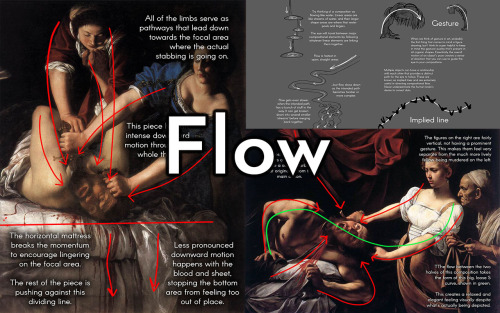
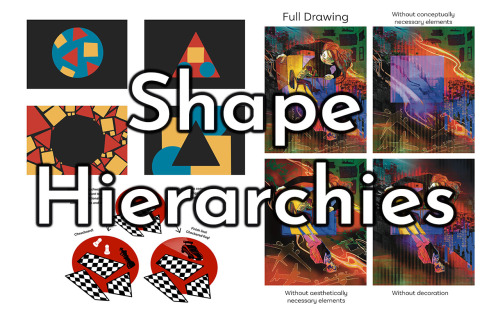
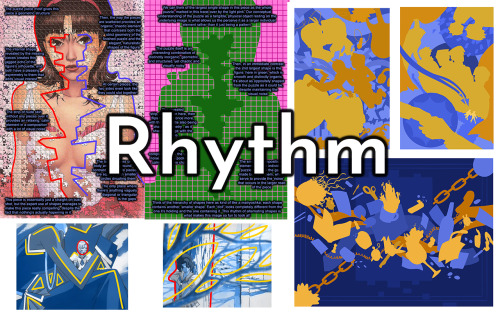
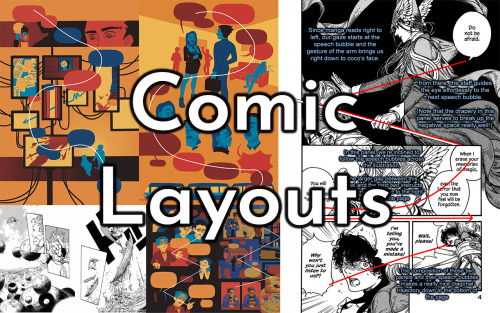
Hello everyone! after a couple of months of work on this beast of a thing, the first draft of my promised writeup on understanding composition is finally ready! This badboy is almost 15,000 words, and over 150 pages long. In these images, you can see a couple of examples of the kind of subject matter I’ll be covering, but it’s very comprehensive.
This is currently available on my Patreon starting at just $2!
I think what I offer is a pretty unique take on composition, and it’s geared to be understood without a lot of consideration for the more finnicky technical elements of drawing, so if that’s part of art you have trouble with you might find some answers in my approach. Using my own art and examples from various disciplines and eras, I break down how to understand why a composition does - or doesn’t - work, all building to a toolset that lets you have control over your own compositions with precision and intent.
A sincere thank you to anyone who takes the time to look at it, and at the end of the day, always remember one fundamental rule of art:

-
 starlacanth reblogged this · 3 months ago
starlacanth reblogged this · 3 months ago -
 doe-is-tired reblogged this · 3 months ago
doe-is-tired reblogged this · 3 months ago -
 doe-is-tired liked this · 3 months ago
doe-is-tired liked this · 3 months ago -
 assistant-honcho reblogged this · 3 months ago
assistant-honcho reblogged this · 3 months ago -
 oldgayjew liked this · 5 months ago
oldgayjew liked this · 5 months ago -
 inthescreen liked this · 5 months ago
inthescreen liked this · 5 months ago -
 thumperjoey liked this · 5 months ago
thumperjoey liked this · 5 months ago -
 bobv48-blog reblogged this · 5 months ago
bobv48-blog reblogged this · 5 months ago -
 bobv48-blog liked this · 5 months ago
bobv48-blog liked this · 5 months ago -
 guccicologne liked this · 11 months ago
guccicologne liked this · 11 months ago -
 yourlocalotaku666 liked this · 1 year ago
yourlocalotaku666 liked this · 1 year ago -
 analbees reblogged this · 1 year ago
analbees reblogged this · 1 year ago -
 vaithne reblogged this · 1 year ago
vaithne reblogged this · 1 year ago -
 feather-dancer liked this · 1 year ago
feather-dancer liked this · 1 year ago -
 villiansswing liked this · 1 year ago
villiansswing liked this · 1 year ago -
 dannybagpipesarecalling reblogged this · 1 year ago
dannybagpipesarecalling reblogged this · 1 year ago -
 dannybagpipesarecalling liked this · 1 year ago
dannybagpipesarecalling liked this · 1 year ago -
 taffyazen liked this · 1 year ago
taffyazen liked this · 1 year ago -
 lightblindingme reblogged this · 1 year ago
lightblindingme reblogged this · 1 year ago -
 lightblindingme liked this · 1 year ago
lightblindingme liked this · 1 year ago -
 brunette-weasel reblogged this · 2 years ago
brunette-weasel reblogged this · 2 years ago -
 brunette-weasel liked this · 2 years ago
brunette-weasel liked this · 2 years ago -
 noiamnotinsane reblogged this · 2 years ago
noiamnotinsane reblogged this · 2 years ago -
 carryonmytardisjohn reblogged this · 2 years ago
carryonmytardisjohn reblogged this · 2 years ago -
 carryonmytardisjohn liked this · 2 years ago
carryonmytardisjohn liked this · 2 years ago -
 bythefeather liked this · 2 years ago
bythefeather liked this · 2 years ago -
 pensivetense liked this · 2 years ago
pensivetense liked this · 2 years ago -
 opinionatedhumanbeing liked this · 2 years ago
opinionatedhumanbeing liked this · 2 years ago -
 feelingfeathered reblogged this · 2 years ago
feelingfeathered reblogged this · 2 years ago -
 gaycultists liked this · 2 years ago
gaycultists liked this · 2 years ago -
 hillepunk liked this · 2 years ago
hillepunk liked this · 2 years ago -
 thisissostupidomg liked this · 2 years ago
thisissostupidomg liked this · 2 years ago -
 theghostofmoth liked this · 2 years ago
theghostofmoth liked this · 2 years ago -
 sexandpsychiatry reblogged this · 2 years ago
sexandpsychiatry reblogged this · 2 years ago -
 prudabega reblogged this · 2 years ago
prudabega reblogged this · 2 years ago -
 keltaithecrafty reblogged this · 2 years ago
keltaithecrafty reblogged this · 2 years ago -
 monochromerubixcube liked this · 2 years ago
monochromerubixcube liked this · 2 years ago -
 clamavipaucaslacrimas reblogged this · 2 years ago
clamavipaucaslacrimas reblogged this · 2 years ago -
 rosebramblewolf reblogged this · 2 years ago
rosebramblewolf reblogged this · 2 years ago -
 rosebramblewolf liked this · 2 years ago
rosebramblewolf liked this · 2 years ago -
 kerryrenaissance reblogged this · 2 years ago
kerryrenaissance reblogged this · 2 years ago -
 jlilli liked this · 2 years ago
jlilli liked this · 2 years ago -
 goshka-kartoshka liked this · 2 years ago
goshka-kartoshka liked this · 2 years ago -
 yashbaz47 liked this · 2 years ago
yashbaz47 liked this · 2 years ago -
 givengoddess liked this · 2 years ago
givengoddess liked this · 2 years ago

I just reblog fun facts/tipsScience, nature, geology facts etc! + art & writing tips!
67 posts
